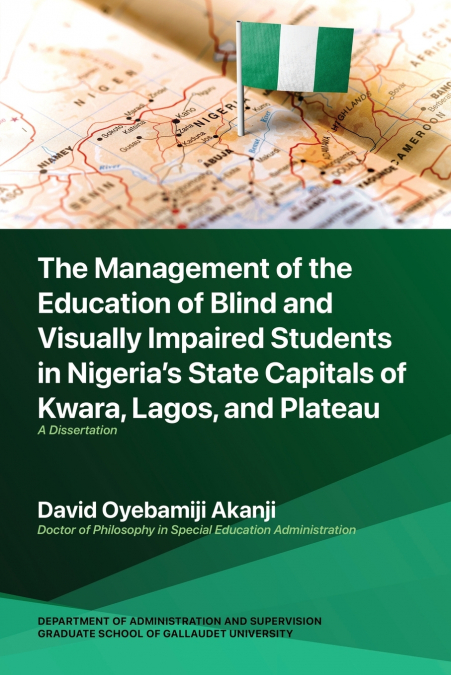
 Librería Perelló (Valencia)
Librería Perelló (Valencia)
 Librería Aciertas (Toledo)
Librería Aciertas (Toledo)
 El AlmaZen del Alquimista (Sevilla)
El AlmaZen del Alquimista (Sevilla)
 Librería Elías (Asturias)
Librería Elías (Asturias)
 Librería Kolima (Madrid)
Librería Kolima (Madrid)
 Donde los libros
Donde los libros
 Librería Proteo (Málaga)
Librería Proteo (Málaga)
This study investigated the problems facing the management of the education of blind students in Nigerian public schools. The research questions addressed (1) assessing the quality and effectiveness of managerial practices governing the management of blind students in self-contained schools, (2) assessing the quality and effectiveness of policies and practices governing the inclusion of blind and visually impaired students in the regular classrooms of mainstreamed schools, (3) the unique nature of the problems confronting the academic performance of blind and visually impaired students in three of Nigeria’s most populous state capitals, and (4) assessing the obstacles associated with the self-concept of blind and visually impaired students. Several research hypotheses were also formulated and tested through appropriate statistical procedures.The data for the study were collected through a survey instrument distributed to a group of high school teachers and principals of the three most populated state capitals. The findings of the study revealed the following conclusions.An effective management of blind education in Nigerian public school requires adequate policies for inclusion of special needs students, proper knowledge about teaching in inclusive classroom, accommodations for inclusion of special needs students, availability of appropriate educational resources, joint effort among general and special education teachers, and allocation of necessary funds.While there are some advantages associated with inclusion of special needs into the regular classroom, there are many disadvantages that need to be taken into consideration if inclusion practices are expected to be successful.As a result of testing the research hypotheses, it was concluded that position, gender, and years of experience were significant factors in the perceptions of survey participants regarding a number of issues associated with the management of blind education in Nigerian public schools.Finally, based on the findings derived from examining the research questions and hypotheses, a number of recommendations were made to school administrators and teachers, the key educational policymakers, parents of blind students, higher education institutions, and federal government. Several suggestions are made to future researchers who might be interested in conducting other possible studies related to the education of blind students, especially in Nigeria.